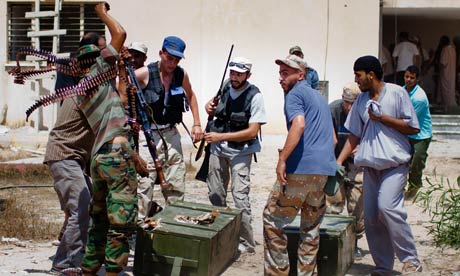Libyan rebels prepare to attack Sirte after Nato raids
- guardian.co.uk,

Libyan rebel fighters loot weapons from a military compound in Tripoli. Photograph: Daniel Berehulak/Getty Images
Rebel units were massing for an attack on Sirte, Muammar Gaddafi's birthplace, on Friday after Nato warplanes conducted intensive bombing raids to weaken one of the last major redoubts controlled by the ousted regime.
On the road to Sirte from Misrata, tanks, heavy artillery and rocket launchers abandoned by fleeing government forces were being assembled for the attack.
Rebels said a British and French special forces team was helping co-ordinate the assault, in which Misrata-based units will push eastwards to meet forces from Benghazi fighting their way westwards.
As the National Transitional Council (NTC) attempted to establish itself in Tripoli, setting up offices and holding a press conference, its claims to complete authority were undermined by skirmishes with Gaddafi loyalists and the failure to find the ousted Libyan leader or his sons.
The continued resistance of traditional Gaddafi strongholds like Sirte has also prevented the NTC from opening the coastal road – a principal artery of Libyan economic life – and uniting the main population centres, and it has yet to conquer the southern city of Sebha, reportedly home to a vast arsenal of weaponry.
NTC attempts to broker a negotiated surrender by Gaddafi forces and loyalist tribes appeared to be failingon Friday, and Nato stepped up its barrage on stockpiled weapons in the town. Nato planes targeted 29 vehicles with mounted weapons, and British Tornado aircraft launched a missile attack on a large underground command bunker.
Britain is also seeking approval from the UN security council to release about $1.6bn (£1bn) in Libyan bank notes printed in the UK but impounded in March, Associated Press reported. The money is needed to help the rebel government pay its public sector workers.
Rebel fighters are commuting every day to the front line in what is a often family affair. Typically, one brother will join his brigade in Tripoli or outside Sirte while the other will stay on checkpoint duty in Misrata, swapping over the following day.
"We keep going," said Abdullah Maiteeg, a former oil engineer, who was preparing to leave for Tripoli to replace his own brother fighting there. He said the priority was to find Gaddafi. "We have to get the G-dog," he said. "I don't stop fighting until I see him."
Misrata-based rebels have also reached the outskirts of Beni Walid, 100 miles south-west, and are attempting to negotiate the surrender its loyalist defenders. They have been involved in some of the bloodiest battles in Tripoli this week, their home-made armoured vehicles much in demand as clashes continue.
As one Gaddafi-run town after another has fallen, there has been mounting concern over the fate of their armouries, after the experience in Iraq where Saddam Hussein's extensive arsenal was used by his supporters to make countless car-bombs to wreak havoc after he fell.
Peter Bouckaert, the emergencies director at Human Rights Watch, returned from Libya in the spring reporting the existence of thousands of shoulder-launched anti-aircraft missiles in unguarded ammunition dumps around the country. He said he was contacted by western intelligence officials concerned they might fall into the hands of terrorists. Since then Bouckaert said there had been a substantial western and NTC effort to collect up those missiles, mostly Soviet-made Sam-7s.
"My concern is that the western focus on Sam-7s obscures the threat of other munitions, like tank shells and artillery shells which can easily be turned into car bombs," Bouckaert told the Guardian. "The biggest arsenals are under Sebha and Sirte where there are vast amouries. Gaddafi has been on a shopping spree for weapons since he came to power and he has everything you can imagine, from exotic weapons like napalm and recent anti-tank missiles which scattered magnetic mines over a large area, to old world war two mortars and shells."
The regime also had a stockpile of mustard gas which was being monitored by the west but has disappeared. The gas however, has not been been put into artillery, Bouckaert said.
The widespread use of mines has contributed to the casualties among civilians and fighters alike. Misrata's Aleiadat hospital is once again choked with the wounded. With the capital's own hospitals overworked, the dead and injured fighters from Misrata are being driven back home. In two days the hospital has registered 12 dead and more than 40 wounded from street fighting in Tripoli.
When power cuts hit in the early hours of the morning and the emergency generators lacked the power to keep air conditioners working, the lightly wounded were wheeled out into the hospital forecourt for the cool breeze coming in off the sea.
No comments:
Post a Comment